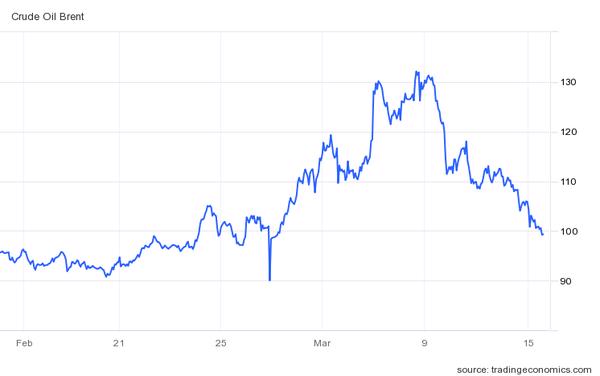Brent back into two digits as initial supply squeeze worries fade
Russia won’t get in the way of Iran deal
No EU-wide energy sanction on Russia
More promising Ukraine ceasefire talks
Fresh Chinese Covid-19 lockdowns

CHART: Brent peaked at intraday levels above $130/bbl on 7-9 March and has since come off sharply. Trading Economics
Front-month ICE Brent has dropped below the $100/bbl mark today for the first time since 1 March.
The futures contract peaked above $130/bbl a week ago and has since tailed off with downward pressure from several factors.
Negotiations to revive the 2015 Iran nuclear deal stalled last week when key intermediary Russia said its backing of a deal was conditional. Russia sought guarantees that any Western sanctions would not prohibit its trading with Iran.
At a news conference with foreign ministers from Russia, Iran and Qatar today, Iran’s foreign minister Hossein Amirabdollahian was cited by Reuters saying that Russia will back Iran through the nuclear negotiations.
“There is no link between events in Ukraine and Vienna talks,” he said.
A nuclear deal is widely expected lift sanctions on Iranian oil and pave the way for more Iranian exports to international markets. This could provide some relief for tight global markets, especially now that Russian oil is shunned and sanctioned by major Western importers.
Initial worries that EU countries would slap oil and gas sanctions on Russia over its invasion of Ukraine have been paired by unwillingness from certain member states to commit to sanctions.
Germany is particularly dependent on Russian imports has ruled out an outright embargo. It fears surging energy prices, supply shortages and runaway inflation could shave several percentage points off its GDP and possibly even plunge the country into a recession.
In the absence of EU-wide sanctions on Russian energy, the US and UK went at it alone last week.
New purchases to the US stopped immediately when the embargo was signed into law. Importers have 45 days to wind down existing contracts, so cargoes will still continue to arrive from Russia over the coming month.
The UK said it will gradually phase out Russian energy commodity imports.
Brent has seen additional downward pressure from hopes of a ceasefire in Ukraine. Negotiations between top Russian and Ukrainian diplomats have reportedly been more fruitful after Russia eased back on its maxims to its neighbour.
Russia has incessantly demanded that Ukraine should not be allowed to join either the EU or NATO and that it should relinquish its territorial rights to the Donbas region. It has also called for the “de-nazification” of Ukraine, in what has been taken to mean a regime change.
Ukrainian President Volodymyr Zelenskyy said talks will continue today. In a video address to world leaders he said negotiations with Russia went “pretty good.”
“We will not concede in principle on any positions. Russia now understands this. Russia is already beginning to talk constructively,” President Zelenskyy’s adviser Mykhailo Podolyak said in a video statement on Monday.
Meanwhile, rising Covid-19 cases in mainland China have fuelled concerns of a fall in demand. The country doubled its count of Covid-19 cases to 3,507 on Tuesday. Movement restrictions have been imposed in Shanghai and Jilin. Flights to Shanghai are set to be diverted to other cities between 21 March and 1 May, China’s aviation regulator said.
More widespread and long-lasting lockdown measures could eat into Chinese oil demand.
“Ongoing peace talks between Russia and Ukraine and the resurgence of virus cases in China, the world's biggest importer of oil, have supported an abrupt turnaround in sentiment,” Saxo Bank’s commodity strategy team said today.





